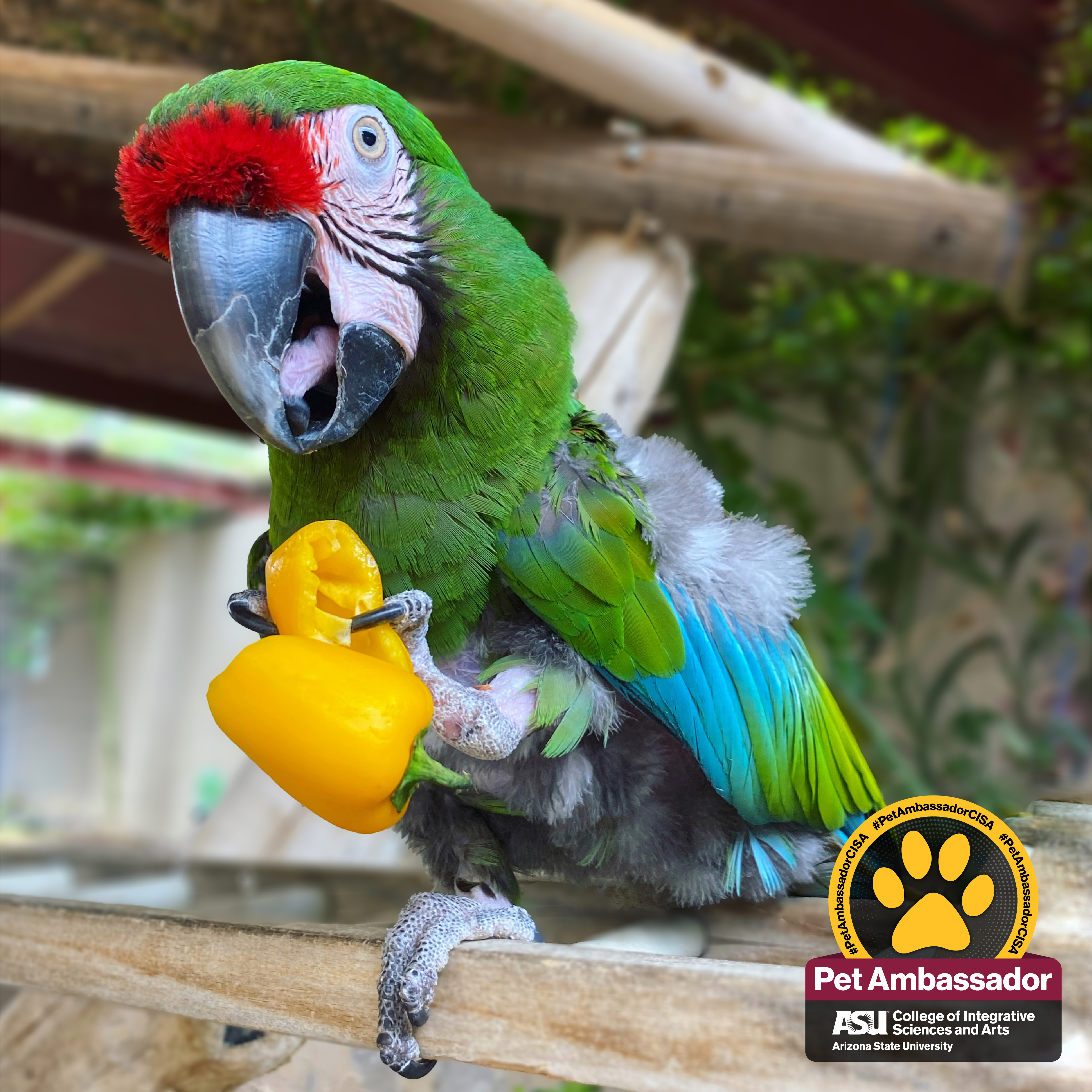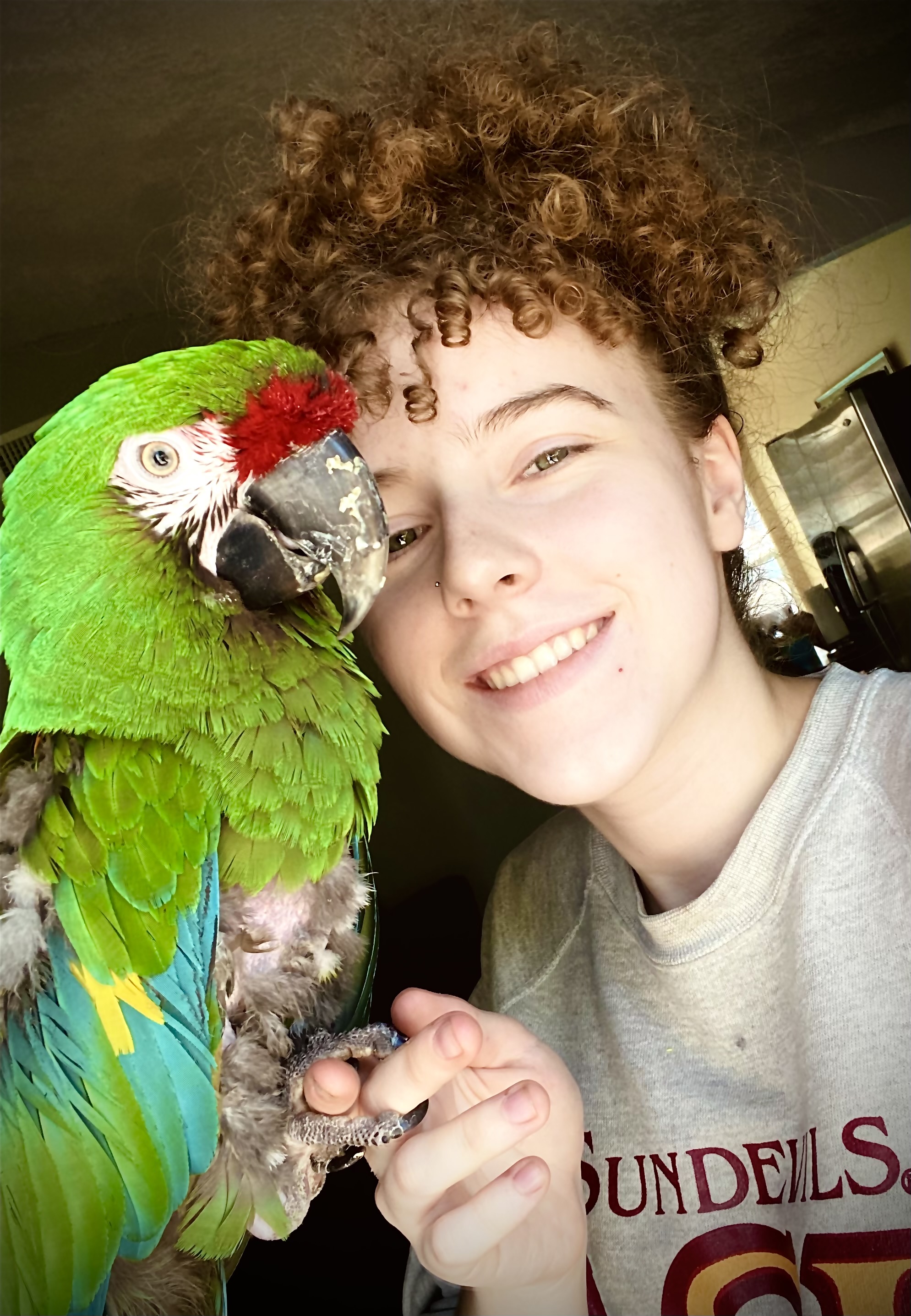
CISA Pet Ambassador Program

Follow Emma and her zoo at @ems_zoo
Feathered friend
Military macaw Harley was rescued from an abusive home by pre-veterinary student Emma. Harley suffered terrible abuse early in life: her wings were butchered and she lived in a cage with only enough space to move 3 inches left or right.
Not surprisingly, Harley was frightened, timid and very aggressive when she first came to live with Emma.
Emma got Harley to trust her through love, patience and determination, and a beautiful bond developed.
Knowing she was safe, Harley let down her wall of aggression and is now one of the friendliest military macaws her exotic animal veterinarian has ever met.
Overcoming abuse wasn’t Harley’s only obstacle. Harley had a lot of feather loss due to plucking. She underwent a procedure to remove her broken primary feathers and to encourage new growth. Over time new feathers grew in, but Harley kept plucking. A clear sign something is not right.
Emma, who works for Harley’s veterinary practice, requested a comprehensive chemistry panel and other tests to help figure out this mystery.
The news was not good. Harley tested positive for avian bornavirus (ABV), an incurable virus that can lead to proventicular dilatation disease (PDD), which is almost always fatal.
Harley was immediately started on medication, and Emma changed Harley's diet and lifestyle to keep the disease in check.
Now, 10-year-old Harley is thriving. Her ABV is under control and Harley is an integral part of Emma’s family or, as she calls it, “Emma’s Zoo.”
Harley happily spends her days loving on Emma, yelling at her African gray brother Rico to “STOP” when he gets too loud, and inspiring other parrot parents going through the ABV journey.
More about Avian Bornavirus
Commentary by veterinarian Dr. Sarah Churgin, Clinical Assistant Professor of Animal Health, College of Integrative Sciences and Arts, ASU Polytechnic campus.
Harley has been diagnosed with avian bornavirus (ABV). This virus is passed between birds and particularly affects parrots, although other bird species can also be affected. The main importance of ABV in veterinary medicine is that it is the cause of a serious neurological illness called proventricular dilatation disease (PDD). The field of PDD study is still evolving; it’s a tricky disease that has remained a mystery for many years. It remains somewhat elusive, as many birds infected with the ABV virus will never develop the syndrome associated with PDD, and not all birds with symptoms of PDD will test positive for ABV. However, we know there is a strong link between the two.
The additional challenge of PDD is that while there are “classic” signs that usually involve the gastrointestinal tract (the proventriculus, for which the syndrome is named, is part of the stomach of birds), there can be other signs as well. For instance, the heart and neurological system can also be involved, so affected birds may show unusual clinical signs that don’t necessarily tip off the veterinarian to think of PDD.
Like many viruses, there’s no great treatment for PDD. Harley is taking an anti-inflammatory medication called celecoxib; this is a common treatment for birds with this disease but will not provide a cure. In Harley’s case, because her owner Emma has been very proactive with her care and treatment, she will hopefully continue to lead a healthy life and never develop the more severe signs of PDD.
If you have a bird yourself, you might wonder what you can do to prevent or test for ABV. Unfortunately, the jury is still out on this. Birds can be tested easily, but since many will test positive and may never develop PDD-related disease, it’s hard to know how to make decisions after a positive result. If new birds are being brought into your house and you already own other birds, it’s wise to schedule a discussion with your avian veterinarian to decide how to approach quarantine, testing and introductions of your new birds to your current pets.


